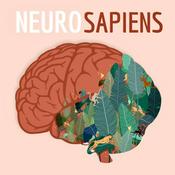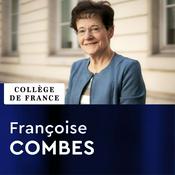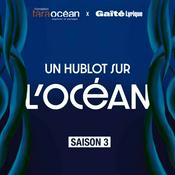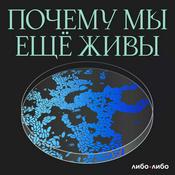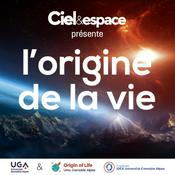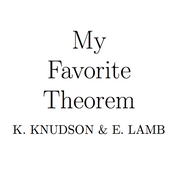1202 épisodes
- Former Costa Rican President Laura Chinchilla joins us for a conversation on global democratic backsliding, the role of the international community, and youth civic engagement. As a distinguished leader with experience at the highest level of national and global political affairs, President Chinchilla brings distinctive viewpoints to our conversation to foster democracy through democratic practices, public policy, and civil discourse. She currently serves as co-chair of the Inter-American Dialogue think tank, the newly inducted president of Club de Madrid, an independent, non-partisan organization created to promote democracy, and member of international initiatives like the United Nations Human Development Report and the International Olympic Committee.
Learn more about your ad choices. Visit megaphone.fm/adchoices
Support our show by becoming a premium member! https://newbooksnetwork.supportingcast.fm/political-science Yunus Emre Ozigci, "NATO’s Meaning and Existence: Within the Interstate Intersubjectivity" (Vernon Press, 2026)
21/1/2026 | 1 h 23 minNATO’s Meaning and Existence: Within the Interstate Intersubjectivity (Vernon Press, 2026) a forthcoming 2026 book by Yunus Emre Ozigci, offers a deep analysis of NATO's identity and role, suggesting it's stuck in bureaucratic inertia despite modern crises, aiming to redefine its purpose through exploring shared identity and transformation, particularly in the context of Russia's actions. This scholarly work uses intersubjectivity to understand how NATO's internal dynamics and external relations, especially concerning the Ukraine conflict, shape its meaning beyond mere military power, potentially moving beyond traditional IR theories to explore collective identity and systemic challenges.
In NATO’s Meaning and Existence: Within the Interstate Intersubjectivity (2026), Ozigci treats NATO as an intersubjective phenomenon rather than an objective entity. To him, NATO “does not exist objectively” but rather appears “meaningfully through intersubjective recognition.” His skillful integration of philosophical innovations from such thinkers as Edmund Husserl, Martin Heidegger, and Jean-Paul Sartre supports his deep insights into Kenneth Waltz's structural interpretations of the balance of power, John Mearsheimer’s offensive realism, and Robert Keohane's complex interdependence and invites readers to reconsider how alliances exist beyond the surface of policy and power. This work reminds us that NATO’s real strength does not necessarily come from being the most efficient military structure in the world, promoting those who excel at following orders, but rather from its ingenuity, resourcefulness, and unity of purpose. His study provides a rare synthesis of diplomatic experience and philosophical depth, inviting readers to reconsider how alliances exist beyond the surface of policy and power. This is an original, meticulously argued, and intellectually stimulating contribution to both NATO studies and the philosophy of international relations.
Piotr Pietrzak, Ph.D. -- In Statu Nascendi Think Tank
Yunus Emre Ozigci holds a PhD degree in Political Sciences from the Université catholique de Louvain. He graduated from the Galatasaray University (International relations) and completed his MA studies at the University of Ankara (International relations). His research interests and publications cover the IR theory and phenomenology. Since 2000, he has been working as a diplomat in the Turkish Ministry of Foreign Affairs and served, besides various departments of the Ministry, in Algeria, Belgium, Switzerland and Russia. Currently, he is the First Counsellor of the Turkish Embassy in Nairobi and Deputy Permanent Representative to UNON (UNEP and UN-Habitat). ORCID: 0000-0003-3388-7149
Please note: This publication is a personal work. It does not reflect the official views of the Turkish Ministry of Foreign Affairs.
Learn more about your ad choices. Visit megaphone.fm/adchoices
Support our show by becoming a premium member! https://newbooksnetwork.supportingcast.fm/political-scienceDuncan Kelly, "Worlds of Wartime: The First World War and the Reconstruction of Modern Politics" (Oxford UP, 2025)
19/1/2026 | 1 h 25 minWorlds of Wartime: The First World War and the Reconstruction of Modern Politics (Oxford University Press, 2025) by Duncan Kelly is a new intellectual history of the many and varied ideas about politics and economics that were made, and remade, through wartime and revolution, by political and economic thinkers working across the globe, from the 1880s to the 1930s. Spanning continents, connecting networks of people, power, and possibilities, in new and often experimental ways, the worlds of wartime saw histories of modern politics and economics revised and updated, used as well as abused, in myriad attempts to interpret, explain, understand, explore, and indeed to win, the war. This book takes the measure of a great many of these overlapping visions, and it does so by trying to learn some of the lessons that literary and artistic modernism can teach us about the complexities of political and economic ideas, their contingency and uncertainty, and how they are fixed into focus only at very particular moments. Moving from the stylised narratives of European and American political theory and intellectual history, through to the futurist politics of revolutionaries in Ireland, India, Ottoman-Turkey, and Russia, this book also tracks arguments and strategies for Pan-African diasporic federation, alongside German and American debates about federal pasts and federal futures. From the invention of the world economy, to the reality of multiple war economies, from revolutionary conjunctures to ideas of democracy and climate catastrophe in the Anthropocene today, Worlds of Wartime tells the story of just how strongly modern politics in general, and modern ideas about political and economic possibility, were fixed by the intellectual turbulence wrought during the First World War.
Learn more about your ad choices. Visit megaphone.fm/adchoices
Support our show by becoming a premium member! https://newbooksnetwork.supportingcast.fm/political-scienceA. Mechele Dickerson, "The Middle-Class New Deal: Restoring Upward Mobility and the American Dream" (U California Press, 2026)
17/1/2026 | 55 minAn expansive policy blueprint for meaningfully expanding the middle class for the first time in a century The US middle class was a product of state and federal policies enacted in the wake of the Great Depression. But since the 1980s, lawmakers have undermined what they once built, shredding the social safety net and instituting laws that virtually guarantee downward mobility for all but the most privileged. How can we restore what has been lost? Rigorous and highly readable, The Middle-Class New Deal: Restoring Upward Mobility and the American Dream (U California Press, 2026) breaks down the policies that have decimated working families and proposes reforms to reverse this trend. As Mechele Dickerson shows, part of the problem is that politicians disingenuously conflate the middle class with the "White lower rich." Such propaganda hides how state and federal lawmakers consistently favor education, labor, housing, and consumer-credit laws that erode the bank accounts of lower- and middle-income people--especially those who are not White and don't have college degrees. Weaving together the latest research with the personal stories of Americans struggling to make ends meet, Dickerson provides a clarion call for political leaders to enact a bold agenda like the one that created the middle class almost a century ago.
A. Mechele Dickerson is the Arthur L. Moller Chair in Bankruptcy and Practice and University Distinguished Teaching Professor at University of Texas School of Law. Professor Dickerson is a nationally recognized scholar on financial vulnerability, consumer debt, housing affordability, and racial and economic disparities. She regularly teaches Remedies and Federal Civil Procedure at the School of Law, has taught a class on civil procedural disputes that arose between the two Trump presidencies, and has taught numerous cross-listed interdisciplinary graduate-level courses on the American middle-class and the COVID pandemic. She is also the author of Homeownership and America's Financial Underclass: Flawed Premises, Broken Promises, New Prescriptions.
Learn more about your ad choices. Visit megaphone.fm/adchoices
Support our show by becoming a premium member! https://newbooksnetwork.supportingcast.fm/political-scienceMichael J. Illuzzi, "Mending the Nation: Reclaiming We The People in a Populist Age" (UP of Kansas, 2025)
15/1/2026 | 42 minPolitical Scientist Michael Illuzzi has a fascinating new book on peoplehood in the United States, focusing on different political actors at different crucial points in American history, and how the “story” of American peoplehood has been told. This idea of “peoplehood” is not necessarily new, since it brings with it a connection to the country where one is a citizen. But for the United States, this concept has been defined and redefined over more than 250 years and often connects back to the promise of the Declaration of Independence, where the commitment to equality was articulated, but has never been fully recognized or achieved. Part of what Illuzzi is doing in Mending the Nation: Reclaiming We The People in a Populist Age is explaining, through a number of case studies, the difference between what are called “mending stories” and “bleaching stories”—those narratives that design a country that is more inclusive, that explain the past but also work towards mending earlier injustices, in contrast to those narratives that choose to erase historical injustices and inequalities and, in the process, also define the American fabric as exclusionary. This framework, drawing out these different approaches to narratives about American peoplehood, is vitally important as we find ourselves at this particular inflection point, with daily debates and armed conflicts over who is and isn’t allowed to be considered an American.
The case studies at the heart of Mending the Nation: Reclaiming We The People in a Populist Age include the Civil War and Abraham Lincoln, Mayor Samual Jones (of Toledo) and the integration of immigrants at the turn of the century, Franklin D. Roosevelt and the New Deal, Martin Luther King Jr’s coalition building beyond the Civil Rights Movement, Black Panther Leader Fred Hampton’s Rainbow Coalition in Chicago in the 1960s, and finally the Poor People’s Campaign led by Rev. Dr. Liz Theoharis and Rev. Dr. William Barber II. In each case, Illuzzi examines different kinds of opposition to more authoritarian, more divisive, or more oppressive approaches, in the speeches and in the coalitions that are being built by those leading towards mending narratives. Part of the analysis is also about how political coalitions are expanded—especially in ways that may be unexpected, when common issues (like poverty, or police brutality, or healthcare access) transcend ethnic, racial, or even political boundaries and groupings.
This is a beautifully written discussion of the idea of the United States, and the ways in which politics, race, ethnicity, and class are all woven together within the broader fabric of a country “dedicated to the proposition that all men are created equal.” Mending A Nation: Reclaiming We The People in a Populist Age is particularly important in helping us to think about and possibly act on “from many, one” in the age of divisive populism and discrimination.
Lilly J. Goren is a professor of political science at Carroll University in Waukesha, WI. She is co-host of the New Books in Political Science channel at the New Books Network. She is co-editor of The Politics of the Marvel Cinematic Universe Volume I: The Infinity Saga (University Press of Kansas, 2022), and of The Politics of the Marvel Cinematic Universe Volume II: Into the Multiverse (University Press of Kansas, 2025) as well as co-editor of the award winning book, Women and the White House: Gender, Popular Culture, and Presidential Politics (University Press of Kentucky, 2012). She can be reached @gorenlj.bsky.social
Learn more about your ad choices. Visit megaphone.fm/adchoices
Support our show by becoming a premium member! https://newbooksnetwork.supportingcast.fm/political-science
Plus de podcasts Sciences
Podcasts tendance de Sciences
À propos de New Books in Political Science
This podcast is a channel on the New Books Network. The New Books Network is an academic audio library dedicated to public education. In each episode you will hear scholars discuss their recently published research with another expert in their field.
Discover our 150+ channels and browse our 28,000+ episodes on our website: newbooksnetwork.com
Subscribe to our free weekly Substack newsletter to get informative, engaging content straight to your inbox: https://newbooksnetwork.substack.com/
Follow us on Instagram and Bluesky to learn about more our latest interviews: @newbooksnetwork
Support our show by becoming a premium member! https://newbooksnetwork.supportingcast.fm/political-science
Site web du podcastÉcoutez New Books in Political Science, Choses à Savoir SCIENCES ou d'autres podcasts du monde entier - avec l'app de radio.fr
Obtenez l’app radio.fr gratuite
- Ajout de radios et podcasts en favoris
- Diffusion via Wi-Fi ou Bluetooth
- Carplay & Android Auto compatibles
- Et encore plus de fonctionnalités
Obtenez l’app radio.fr gratuite
- Ajout de radios et podcasts en favoris
- Diffusion via Wi-Fi ou Bluetooth
- Carplay & Android Auto compatibles
- Et encore plus de fonctionnalités

New Books in Political Science
Scannez le code,
Téléchargez l’app,
Écoutez.
Téléchargez l’app,
Écoutez.








